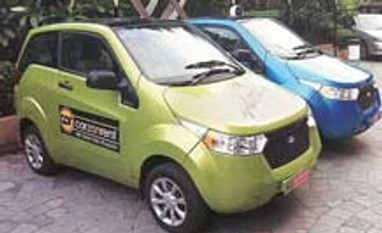With car makers increasing prices, self-driven car service providers such as Carzonrent, Car Club and ZoomCar are planning to expand the business by increasing their fleet strength.
Run by Carzonrent, Myles, the largest player in the self-drive market, is present in 20 cities with 100 locations. Myles, which owns a fleet of 660 cars currently, will expand the fleet to 40,000 cars in the next five years with an investment of Rs 400 crore.
| ROLLING WHEELS |
|
Sakshi Vij, executive director at Carzonrent, said, “Demand for self-driven cars is high nowadays. The customers can just pick a car from any of the available locations. There are no concerns related to owning a car such as EMIs, maintenance, insurance and parking, etc.” Myles started its operations one year ago with 14 cars.
Carzonrent is backed by investors such as SIDBI Ventures, WestBridge Capital and BTS Advisors. “We are exploring various options such as private equity (PE) funding and public listing to raise money for our next five-year expansion,” Vij said.
Myles will expand the number of its locations to 300 in six months. Between Mumbai and Pune, Myles will add 50 more locations in six months from the current five.
“If you compare the cost, the cost of owning a car is high, while you can enjoy all the facilities with a self-driven car,” Vij said.
Under Myles, about 33 car models are available at prices ranging from Rs 399 a day for Tata Nano to Rs 9,500 a day for a Mercedes Benz E Class. Also, services are available for hourly basis like Rs 99 for an hour for Nano and Rs 1,200 an hour for Mercedes Benz inclusive of fuel cost.
Another leading player Car Club, backed by US-based investor Berggruen Holdings Inc, is investing $30 million (Rs 180 crore) in the next three years to expand its self-driven car fleet to 5,000 from present number of 300 cars. The firm, which is not into economy segment, will add more luxury cars such as Audi, Mercedes and BMW to its fleet. Currently, it offers BMW 5 Series at Rs 6,000 a day, while multi-utility vehicles like Toyota Innova and Ford Endeavour at Rs 2,800 a day.
SP Balasubramanian, managing director & CEO, Car Club, said, “By April-May, we plan a big launch of our business with setting up a new vertical for self-drive car business. We are launching customer loyalty programmes for our corporate clients.” According to him, Car Club sees about 250-270 rentals during weekends.
To address the security concerns, the companies have installed GPS trackers in cars and conduct identity verification of their customers.
Recently, Bangalore-based ZoomCar India, which runs a membership-based, self-driven car rental service under the brand, Zoom, raised $8 million (Rs 50 crore) led by Sequoia Capital. ZoomCar will expand into cities like Delhi, Mumbai, Chennai and Hyderabad, by adding 2,000 more vehicles. Currently, it owns a fleet of 250 vehicles across Bangalore and Pune.
Recently, all the major car manufacturers like Maruti, Honda and Hyundai decided to raise car prices as excise sops were withdrawn by the government. Honda Cars India increased prices of its vehicles by up to Rs 60,000 due to the increased excise duty and rising input costs. The new government has decided not to extend excise duty concessions to the auto and consumer durables sectors after its expiry on December 31, 2014.
The Indian radio taxi market is pegged at $8 billion, while organised players own just five per cent market share.
)